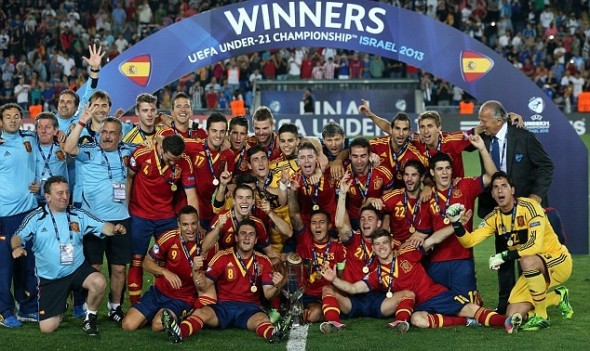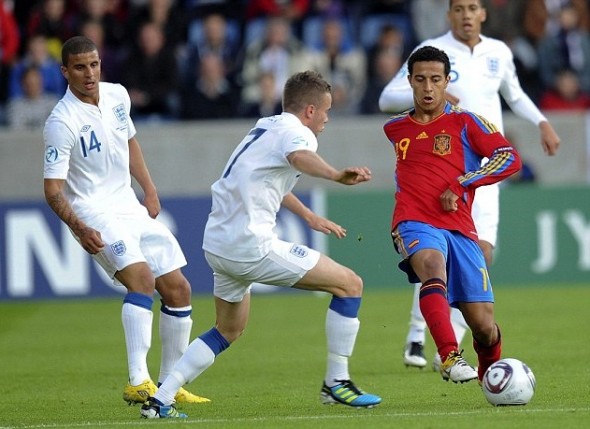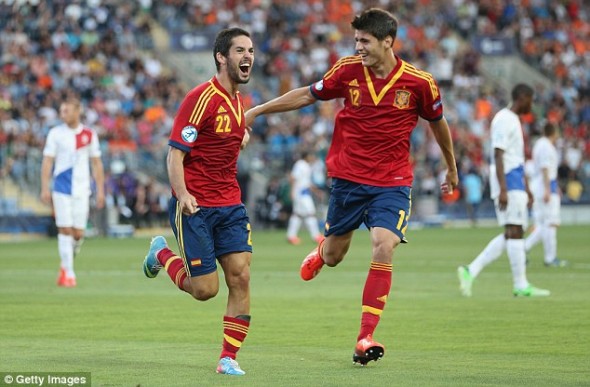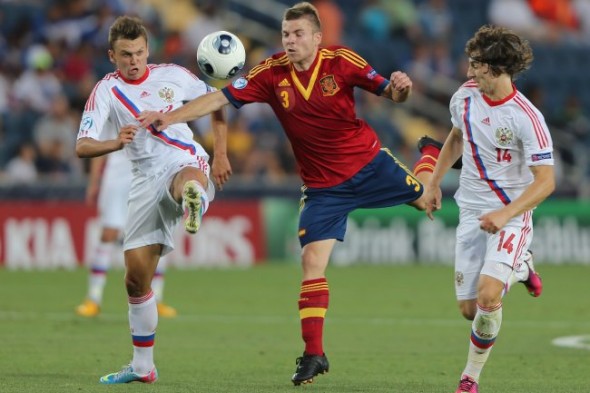 The European U-21 Championships came to an end on Tuesday night, Spain the victors after demolishing Italy 4-2 in the final.
The European U-21 Championships came to an end on Tuesday night, Spain the victors after demolishing Italy 4-2 in the final.
The tournament is a chance for nations to start breeding success at an early age, and the likes of Germany, Italy, Netherlands and Spain have started taking the setup very seriously.
Ingrain the winning mentality from an early age and the senior side prospers.
Here, Discount Football Kits looks at the trends and major talking points that emerged from the competition in Israel.
Unbeatable Thiago and his curious skill set

It was initially believed that Thiago Alcantara would replace Xavi and Cesc Fabregas would replace Andres Iniesta.
The two pairs boasted similar skill sets, and it only seemed natural to bring the fresh pair up together so they forged a telekinetic link on the field.
But Thiago has turned out differently, and when given the license to play his game, mixes a curious hybrid of the attacking midfield and central midfield positions in his game.
It’s what happens when an incredibly intelligent No. 10 moves to a deeper role on the pitch, and now Thiago looks more likely to surge forward á la Iniesta rather than dictate the tempo like Xavi.
Barcelona will either be delighted, or frustrated, to realise he is neither of the above: He is Thiago, a rare breed of footballer who can change games in so many different ways.
If his side need him to, Thiago can sit deep and recycle possession to kill the tempo and gain control. But if they need a breakthrough, Thiago can be the difference; Dribbling past players with ease, delivering set pieces and getting into the box to score.
Isco’s Intelligence

For many, this was the first good look at Isco.
Casual fans will have been told about him prior to Malaga’s tie with Borussia Dortmund in last season’s UEFA Champions League, but he had little-to-no impact on that fixture other than his surprisingly bold hair style change.
But his intelligent footballing mind and mesmerising skill set shone through at the Euros, and he formed one of the most penetrative parts of a jagged-edged Spanish attack.
Always in the right place, always picking up the loose balls that everyone thinks are gone; Isco is two-three seconds ahead of everyone else and sees the entire pitch before him.
His ability in tight spaces and wand of a foot when it comes to passing and shooting make him an all-round, can’t-miss prospect.
Illarra brings back the single pivot

Clubs have been obsessed with the 4-2-3-1 formation since Jose Mourinho conquered Europe using it with Internazionale.
The flood of international sides using it at Euro 2012 only heightened the surrounding fervour, making it the default option for most top-tier sides.
Spain, though, have persisted with their organic 4-3-3 system that is used at every single age level, and it only requires one player to play as a sweeping, holding midfielder; In the senior side it’s usually Sergio Busquets, for this particular tournament it was Asier Illarramendi.
The Real Sociedad midfielder attracted a lot of praise throughout the tournament for his crunching, mindful and clever displays shielding the back four.
In his first game, in particular, he was the standout performer despite Thiago’s brilliance and Alvaro Morata’s late winner.
He might just inspire some teams to check in on the 4-3-3 once more, utilising just a single holding midfielder instead of the now-traditional two.
England going backward

If you went into the tournament hoping England could pull up some trees, there’s no doubt you’ll have been left bitterly disappointed.
There was no repeat of 2009’s final appearance against Germany, instead losing all three games to Italy, Norway and Israel. The final loss, against the hosts, was particularly woeful.
Stuart Pearce will not have his contract renewed by the English FA and that’s a step in the right direction—his tenure at the helm had gone a little stale, and it was tough to put your finger on the much-talked about “identity” of the team.
Ahead of a qualification match between England’s U-21s and Spain’s U-21’s, Thiago admitted he’d never heard of any of the Three Lions’ players and was confident of victory.
Glance at Spain’s team, and you’ve got players playing full seasons in La Liga, Bundesliga and the English Premier League.
It becomes pretty easy to spot the problem.
The solution is not easy. The money involved in the Premier League dictates that teams source talent from elsewhere rather than grow their own, and the extortionate fees at which English players change hands put people off scouting domestically.
One fine example is Aston Villa’s pursuit of a left-back this season and last; Priced out of a move for Aaron Cresswell (circa £6 million), they’ve captured Sevilla youngster Antonio Luna for £1.5 million instead.
In terms of raw figures, Villa made the right financial deal. In terms of England’s future, that “pricing out” is an underlying theme of the transfer market which contributes heavily to the senior side’s lack of established options.









